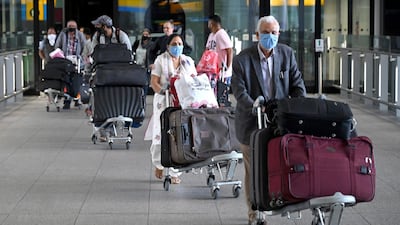British airlines have been told by the government that any passengers arriving in the UK will be required to enter a 14-day quarantine.
The new government guidance is expected to come into effect at the end of May, but passengers from the Republic of Ireland will be exempt.
The head of the UK Airport Operators Association, Karen Dee, said the plan would have a devastating impact on the aviation industry.
"What we would say to government is they should be under no ilusion - this will have a really traumatic impact on our sector," she told Sky News.
On arrival, passengers must self-isolate in a private residence and will face fines of up to £1,000 or deportation for breaking the rules.
The British government received criticism this week as new figures showed only 273 of around 18.1 million arrivals into UK airports between January and March - when the coronavirus was spreading across the world - were put into isolation.
Similar quarantines for passengers were put in place in Australia and Israel eight weeks ago. But the government had resisted measures for the UK as it was seen to have limited impact with the virus entrenched in the population.
The decision to impose a quarantine now is part of measures to prevent a second spike of coronavirus as the UK takes the first tentative efforts to ease the lockdown. More than 31,000 people have died in the UK, the second highest death toll in the world behind the United States.
The UK's Aviation Minister Kelly Tolhurst is expected to outline more detail on the new policies on Sunday morning in a call with airline representatives, and Boris Johnson will reveal further information to the public in an address on Sunday evening.
Travellers will have to provide the address at which they will self-isolate on arrival, The Times newspaper reported.
"These measures will help protect the British public and reduce the transmission of the virus as we move into the next phase of our response," it quoted a government source as saying.
Airlines UK, which represents some of the UK's largest airlines, initially rejected the proposal when it was mooted in April, saying it would “effectively kill international travel to and from UK”.
But on the announcement of the policy on Saturday, it said "a credible exit plan" was needed and asked for weekly reviews of the policy.

